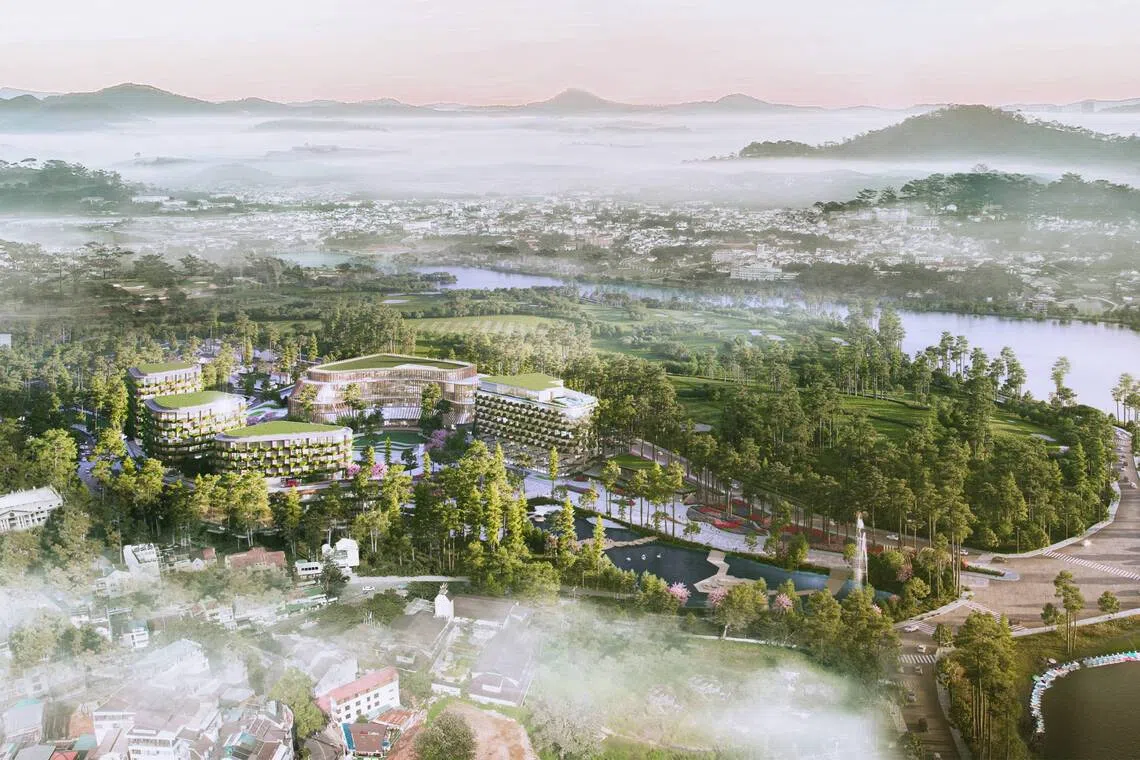Why are millionaires leaving Vietnam?
Even as the rich move money and citizenship abroad, Vietnam is trying to lure talent back home

[HO CHI MINH CITY] After being detained for 30 months, Vietnamese property tycoon Nguyen Phuong Hang – famed for her livestream exposes of celebrities and businessmen – relocated to Cyprus, a jurisdiction that in the past decade has become known for granting citizenship and residency to global investors.
Referring to her detention, the 54-year-old, who has repeatedly talked about emigration in the past year, said: “I no longer have any reason to live in Vietnam. It was the last straw.”
“I’m leaving to find peace… I’m going to Cyprus, which is my second homeland,” she added.
Flaunting diamonds and land titles “measured by kilograms”, Hang, along with her husband Huynh Uy Dung, owns Dai Nam – a company that develops and operates industrial parks, residential projects and one of Vietnam’s largest tourist complexes.
She gained fame through her frequently viral livestreams, which were pulling in 400,000 live viewers a session. This was especially so in mid-2021, at the height of Vietnam’s sweeping anti-corruption campaign that implicated various high-profile business people and government officials.
Hang obtained the Cyprus citizenship under the name Christina Nguyen, even before her detention in 2022, on the charge of making baseless allegations and personal attacks against others.
Truong My Lan, the notorious tycoon imprisoned for masterminding one of the world’s largest bank frauds in Vietnam, also reportedly applied to renounce her Vietnamese citizenship back in 2014, alongside nine family members. However, she was reported to have withdrawn the application the following year.
The country in which she sought citizenship is unclear. She is married to Eric Chu, a prominent Hong Kong property magnate.

These moves underscore a broader trend in Vietnam of a growing exodus of high-net-worth individuals (HNWIs) – defined as people with liquid investable wealth of US$1 million or more.
SEE ALSO
Vietnam is experiencing a “worrying uptick in millionaire departures”. There was an estimated net outflow of around 300 HNWIs in 2024, up from 100 in 2022 and 150 in 2023. These figures come from international investment migration advisory firm Henley & Partners and global wealth intelligence company New World Wealth.
Andrew Amoils, head of research at New World Wealth, noted that many of these individuals are moving to Thailand – attracted by its international schools, a growing financial services sector, and luxury real estate offerings. Others relocate to more traditional destinations favoured by wealthy Vietnamese families, such as the US, Canada and Australia.
High-profile arrests of HNWIs in recent years may be driving Vietnamese millionaires away, two investment migration specialists, speaking on condition of anonymity, told The Business Times.
One source said: “The number of applications for such (migration) programmes really soared during Covid, and is related to increased scrutiny from the anti-corruption campaign. People began worrying about their future and assets, and needed a backup plan.”
Behind millionaires’ migration
Vietnam’s wealth creation is booming. The number of millionaires nearly doubled to 19,400 between 2013 and 2023. A Henley & Partners report said this was the fastest growth worldwide.
Knight Frank’s Wealth Report 2025 estimates that Vietnam has 5,459 individuals worth over US$10 million.
Millionaire outflows, however, occur for various reasons beyond emerging markets. Henley & Partners said in its report that in 2025, European Union heavyweights France, Spain and Germany are expected to see net HNWI losses for the first time; Ireland, Norway and Sweden face similar trends as affluent Europeans relocate to more investor-friendly hubs.
Top beneficiaries include Switzerland, Italy, Portugal and Greece, where record inflows are being driven by favourable tax regimes, lifestyle appeal and active investment migration programmes.
This diverse migration pattern reflects broader considerations among wealthy families about safety, stability and quality of life. However, rather than permanent moves to certain locations, many HNWIs pursue a global citizenship strategy by gaining stronger passports and managing their lives and assets in multiple countries.
Hang also said during a livestream session in September that Cyprus would not be her last destination: “Cyprus is peaceful, but somewhat tedious… I plan to move to another country, maybe Switzerland, France or Poland. I want to live somewhere I feel happy and attracted to.”
She previously cited the advantages of Cyprus joining the Schengen zone, a move that grants its citizens and visitors unprecedented access to the rest of Europe.
The Henley Passport Index ranked Cyprus 13th globally in terms of passport strength, while Vietnam is 88th. Singapore currently holds the top spot, offering its citizens the highest level of visa-free or visa-on-arrival access.
Long Phan, founder and chief executive at Australia-headquartered migration advisory firm Hali Global, which provides services for Vietnamese HNWIs, noted that global political and economic uncertainties often motivate HNWIs to diversify citizenships and investments across continents.
This strategy enables them to maintain ties to their home countries while accessing education, healthcare and financial opportunities abroad.
Phan noted the role of ongoing political and economic instability in wealthy US citizens’ search for more stable, diversified environments for investment and residence. Nearly half the applicants for New Zealand’s Active Investor Plus Visa programme between April and end-August 2025, for example, are from the US.
“The current trend is towards dual citizenship plus permanent residencies in multiple continents,” he said. “If turmoil hits one continent, they simply move to another. Once it stabilises again, they can return.”
Under a drive to retain and attract more HNWIs, the private sector is also stepping in to enhance services and lifestyle offerings for the ultra-wealthy, beyond real estate investments and high-end consumer goods.
Copper Beech, a consultancy renowned for its history of advising, owning and leading private club brands globally such as Soho House and Annabel’s, is co-developing a model tailored to Vietnam’s growing wealthy class.
The first of these private clubs is set to open next year in Da Lat, a tourism hotspot about 300 km north-east of Vietnam’s southern metropolis, Ho Chi Minh City. It will initially be accessible exclusively to buyers of the Haus Da Lat residential project.
The project, developed by The One Destination and backed by Singapore-based multi-industry investment company Terne Holdings, features 68 Sky Villas and Sky Mansions with prices starting at roughly US$1 million a unit.

Matt Hobbs, founder and chief executive of Copper Beech, said: “For the first time in a long time, Vietnam is positioned to really optimise its talents and strategic location... There’s a perfect storm of political will, investments and opportunities (for us to come in).”
He said that today’s ultra-wealthy are no longer satisfied with material luxury alone. They seek intangible privileges – access to private auctions, limited-edition experiences, high-society events, personal connections with influencers, exclusive seating or curated Michelin-star dining, which are hallmarks of prestige and elevated status.
“In the progression of Vietnam into something that’s no longer emerging but is established, in order to have that kind of credibility and profile on the world stage, we are providing a destination that is comparable to those in any of the great cities in the world,” Hobbs added. “Our clubs are a really good reason to stay in Vietnam.”
Getting talent to return home
If the rich have little reason to stay, can Vietnam woo talent from abroad?
The country’s government is working to attract back a select segment of its diaspora – not for their wealth, but mainly for their expertise.
Based on data provided by Vietnam’s Ministry of Foreign Affairs, the global Vietnamese diaspora, often referred to as Viet Kieu, is estimated to number between five million and six million people; between 10 and 12 per cent are classified as experts and intellectuals.
The amended Land Law 2024, effective in 2025, grants overseas Vietnamese full property ownership rights, equal to that enjoyed by domestic citizens, thus simplifying transactions and encouraging investment in local real estate.
In July 2025, Vietnam also relaxed dual-citizenship rules for certain professionals, allowing them to acquire or restore citizenship without giving up their foreign passports.
The government allows market-rate salaries and other benefits to attract Vietnamese residing abroad and foreign experts to work in its state agencies. Visa exemptions are also being introduced for scholars, experts, scientists as well as investors and executives of major global enterprises.
Cuong Dang, an overseas Vietnamese who returned in 2017, wrote in a Jul 27 newsletter on LinkedIn: “Vietnam doesn’t just need returnees. It needs returnees who stay – and build.” The remark underscores the country’s need for these individuals’ operational depth in leadership and in executing in ambiguous environments and the scaling of businesses.
Last December, Dang founded Vietnam Vanguard – a platform for Vietnamese second-generation successors and senior diaspora professionals.
The network’s website states that eligibility is limited to senior executives in firms with annual revenues of at least US$6 million, or financial institutions with more than US$120 million in assets under management.

He pointed out that high-profile returnees to Vietnam often face various challenges: top-down corporate culture limits influence and knowledge sharing; lack of dependent visas complicates family relocations; inconsistent provincial regulations delay work permits and onboarding; and high personal income taxes with little perceived welfare benefits.
“While Vietnam has made significant policy progress, it still faces practical challenges in attracting and retaining senior leadership talent,” he noted.
“If Vietnam is serious about transforming into a regional powerhouse, it must solve the leadership layer. That means bringing back not just talent, but the right talent.”
Decoding Asia newsletter: your guide to navigating Asia in a new global order. Sign up here to get Decoding Asia newsletter. Delivered to your inbox. Free.
Copyright SPH Media. All rights reserved.









